Greece achieves the fastest growth in Europe in the five-year period 2019-2023
According to the statement issued by the Greek Ministry of National Economy and Finance, over the past five years, the Greek economy has made significant progress, achieving top positions in a range of key economic indicators that reflect the noticeable improvement in people’s living standards. Greece has attained one of the fastest rates of growth in the entire EU across several key sectors.
The government does not underestimate the difficulties caused by the global inflationary shock on household purchasing power since 2022, nor does it overlook that wages and salaries still fall short of the European average. However, data shows that since 2019, there has been a transformation of the Greek economy with tangible benefits of growth and a mitigation of inequalities for the benefit of all Greeks. This progress has been recognized by international organizations, foreign governments and analysts.
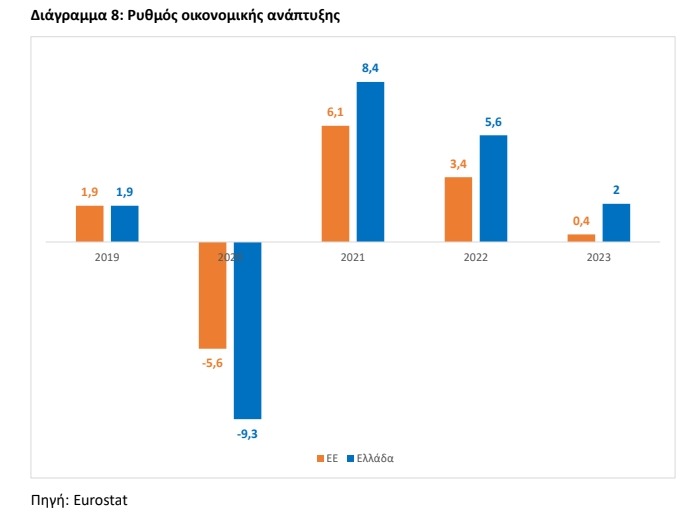
Several economic indicators used by countries worldwide to reflect their growth and prosperity confirm this reality. Greece, over the last five years, holds 7 top rankings among the 27 EU member-states as a result of its high growth rate, which is among the highest in Europe, as during the period 2019-2023 it has achieved:
- The largest reduction in the unemployment rate of any EU country.
- The lowest cumulative increase in consumer prices, meaning the lowest cumulative inflation across Europe.
- The largest percentage increase in investment volume
- The largest reduction in the ratio of public debt to GDP.
- The largest percentage increase in the share of global goods exports.
- The largest increase in the level of competition, as defined and measured by the OECD.
- The largest reduction in the yield spread against the German ten-year bond.
Fact 1: Over 500,000 people have found jobs over the last 5 years, according to data from the Ministry of Labor.
Moreover, according to ELSTAT data, the increase in employment has led to a reduction in unemployment by 8 percentage points, from 18% in 2019 to below 10% today, ranking Greece first for the fastest unemployment decline across Europe. This decrease is particularly pronounced among women and youth, who saw their unemployment rates drop by 10 and 16.5 percentage points, respectively. There has also been a significant reduction in the percentage of the long-term unemployed, which has decreased by 15 percentage points from 2019 to 2022 (the latest available Eurostat data). The improvement in living standards in Greece is confirmed by the positive trends in key poverty and social exclusion indicators. Specifically, according to Eurostat data, the index calculating the percentage of the population at risk of poverty and social exclusion fell from 29% in 2019 to 26.1% in 2023, converging notably towards the European average (21.4%).
Fact 2: In the last five years, both the minimum and average wages in Greece have increased more than prices.
Specifically, between 2019 and 2023, the Consumer Price Index (CPI) cumulatively increased by 13.4% and the harmonized CPI by 13.1%, a significantly lower increase than the European average (20.3%). During the same period, according to data from the ERGANI information system, the average wage increased by 20.2%, while the minimum wage has risen by 27.7% since 2019.
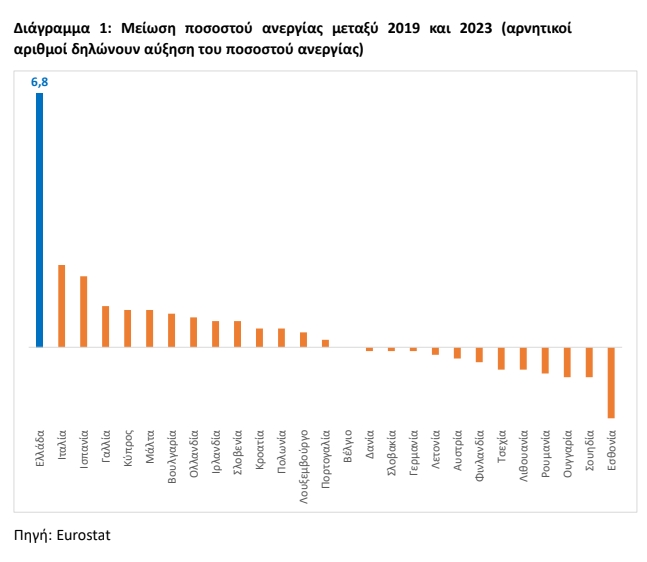
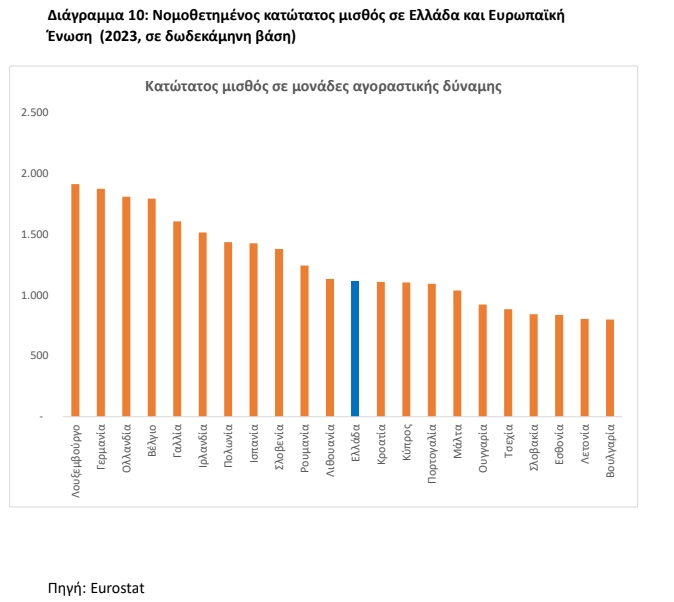
Fact 3: Wages and incomes in Greece are increasing, and generally at a faster pace than in Europe.
Net disposable income in Greece has increased for all types of households with working members. Specifically, according to Eurostat data, from 2019 to 2023, annual net earnings in purchasing power units have increased by between 12.3% and 15.7%, depending on the type/composition of the household. In terms of purchasing power, these earnings in 2023 rank 16th among EU 27 member-states in three of the four main reference categories, and 19th in the fourth. Particularly for workers paid the minimum wage, Greece ranks a middle 12th among 22 member states with a legislated minimum wage in purchasing power units. Even food inflation, which is a more problematic issue compared to average inflation, has shown a downward trend in recent months. Combined with the ongoing rise in wages and incomes, this leads us to expect that disposable income will increase at a faster pace in the foreseeable future. Consequently, the claim that living standards in Greece are second to last in the EU is way off the mark.
Fact 4: Greece shows evidence of a higher rate of increase in individual consumption than the European average.
This is evident from Greece’s ranking in actual individual consumption in terms of purchasing power, where in 2023 Greece stands at 79% of the European average, above six other member states. In this regard, Greece shows a higher rate of increase than the European average, with a cumulative change of 23.4% between 2019-2023, compared to 19.4% for the European average.
Fact 5: Real per capita income has increased in Greece at a rate significantly higher than the European average.
According to Eurostat data, between 2019 and 2023, real GDP per capita in Greece has increased by 7.7%, which is more than double the EU average (3.3%) and nearly triple that of the eurozone (2.3%). Even in terms of purchasing power, GDP per capita in Greece is growing faster than the European average. Over the last five years, the increase in Greece has been 22.8% against 20.1% of the EU average.
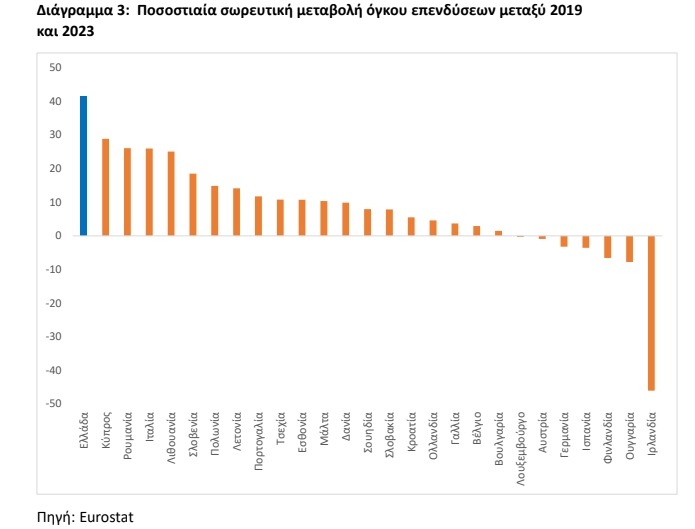
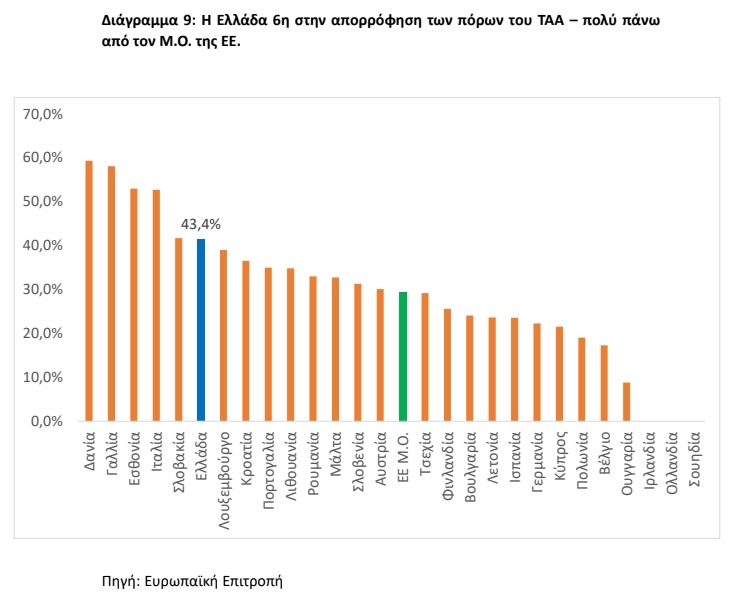
Fact 6: Greece consistently ranks among the top in absorption rates of European funds.
Greece is leveraging European resources to further enhance development. Notably, as regards the Recovery Fund, it ranks 6th in absorption across the entire EU. By October, it will have absorbed 50% of the resources (total budget of €36 billion). Similar performance is recorded in the National Strategic Reference Frameworks (NSRF) 2021-2027, where Greece ranks 3rd in absorption among EU member-states.
Fact 7: Greek deposits are increasing while household debt is decreasing.
According to data from the Bank of Greece, citizen bank deposits have increased by €27.3 billion in recent years (overall, deposits for citizens and businesses have increased by €50 billion). Additionally, there has been a significant reduction in non-performing household and business debt to banks and funds, from €92 billion in 2019 to €69 billion at the end of 2023.
Greek economic growth is recognized by all major international organizations, as well as global markets investing billions through our shares and bonds, the successful privatization program (including banks), and foreign direct investments exceeding €27 billion in the last five years. Finally, this is reflected in the recovery of the investment grade after thirteen years, a development with significant beneficial consequences for Greece’s borrowing costs and public finances. To give an example of what this means for the cost of this year’s borrowing alone, recovering the investment grade results in savings of approximately €800 million over a decade, which can in turn be invested in health, education, and the social welfare system.
Source: Greek Ministry of National Economy and Finance, full report and tables here (pdf, in Greek).
I.L., Tranlsation: Magda Hatzopoulou














